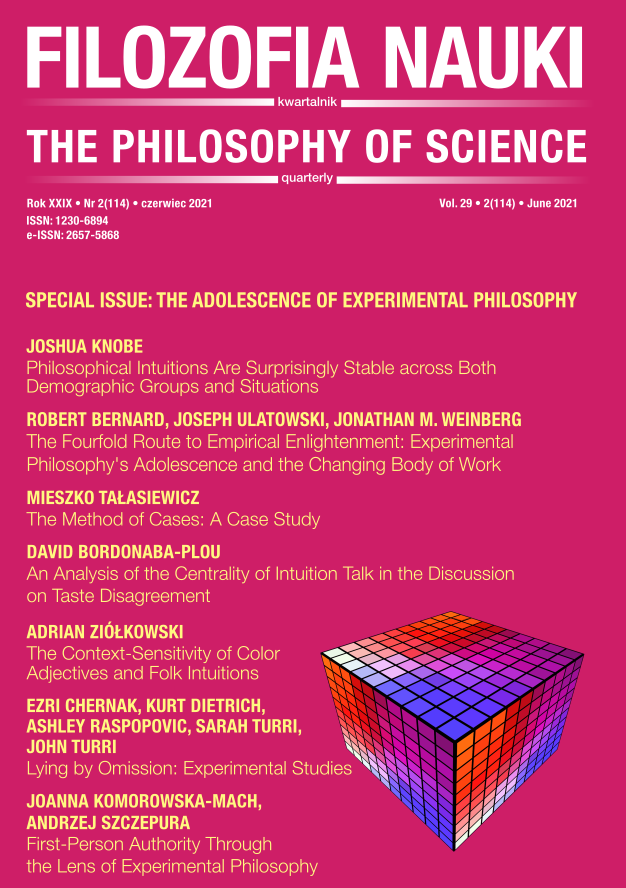The Context-Sensitivity of Color Adjectives and Folk Intuitions
DOI:
https://doi.org/10.14394/filnau.2021.0013Słowa kluczowe:
contextualism, context-sensitivity, context-shifting experiments, color adjectives, folk semantic intuitionsAbstrakt
In this paper, I report new empirical data on folk semantic intuitions concerning color adjectives in so-called context-shifting experiments. Contextualists present such experiments — that is, they describe different conversational contexts in which a given sentence is uttered — in order to argue that context can shape meaning and truth conditions to such a degree that competent speakers would give opposite truth evaluations of the same sentence in different contexts. The initial findings of Hansen and Chemla (2013) suggest that laypersons’ semantic judgments are sensitive to context in the same way that is predicted by contextualists. In this paper, I focus on context-shifting experiments that involve color adjectives; also, I present experiments that are a partial replication and methodological extension of Hansen and Chemla’s study. One aim of my study was to corroborate these authors’ findings using a bigger sample (total N = 1128), but the main goal was to test the stability of results in different methodological variants of empirical adaptations of context-shifting experiments. This part of the study addresses the issues pointed out in my earlier paper (Ziółkowski 2017), where I argued that certain experimental settings (within-subjects) might bring data that is more favorable to contextualism than other settings (between-subjects). My study compares three different experimental settings: within-subjects (with randomized order of context presentation), between-subjects (where participants evaluating different contexts are
distinct groups), and “contrastive design” (where both contexts are presented side by side on the same screen). My results are highly consistent across the methodological variants I employed, but while they show some of the effects expected by contextualists, it is disputable whether they bring strong support to contextualism with respect to color adjectives.
Bibliografia
Borg E. (2007), “Minimalism versus Contextualism in Semantics” [in:] Context-Sensitivity and Semantic Minimalism: New Essays on Semantics and Pragmatics, G. Preyer, G. Peter (eds.), Oxford: Oxford University Press, 546-571.
Buckwalter W. (2010), “Knowledge Isn’t Closed on Saturdays,” Review of Philosophy and Psychology 1: 395-406. https://doi.org/10.1007/s13164-010-0030-3
Buckwalter W., Schaffer J. (2015), “Knowledge, Stakes, and Mistakes,” Noûs 49(2): 201-234. https://doi.org/10.1111/nous.12017
Cohen J. (1995), Statistical Power Analysis for the Behavioral Sciences, 2nd. ed., Hillsdale, N.J.: Erlbaum.
DeRose K. (1992), “Contextualism and Knowledge Attributions,” Philosophy and Phenomenological Research 52: 913-929. https://doi.org/10.2307/2107917
DeRose K. (1999), “Contextualism: An Explanation and Defense” [in:] The Blackwell Guide to Epistemology, J. Greco, E. Sosa (eds.), Malden, MA: Blackwell, 187-205. https://doi.org/10.1111/b.9780631202912.1998.00011.x
DeRose K. (2011), “Contextualism, Contrastivism, and X-phi Surveys,” Philosophical Studies 156(1): 81-110. https://doi.org/10.1007/s11098-011-9799-x
Feltz A., Zarpentine C. (2010), “Do You Know More When It Matters Less?,” Philosophical Psychology 23(5): 683-706. https://doi.org/10.1080/09515089.2010.514572
Francis K., Beaman P., Hansen N. (2019), “Stakes, Scales, and Skepticism,” Ergo 6(16): 427-487. https://doi.org/10.3998/ergo.12405314.0006.016
Grice H. P. (1975), “Logic and Conversation” [in:] Syntax and Semantics, vol. 3, P. Cole, J. Morgan (eds.), New York: Academic Press.
Hansen N. (2014), “Contrasting Cases” [in:] Advances in Experimental Epistemology, J. Beebe (ed.), London: Bloomsbury, 71-95.
Hansen N., Chemla E. (2013), “Experimenting on Contextualism,” Mind and Language 28(3): 286-321. https://doi.org/10.1111/j.1468-0017.2013.12019.x
Hansen N., Chemla E. (2017), “Color Adjectives, Standards, and Thresholds: An Experimental Investigation,” Linguistics and Philosophy 40: 239-278. https://doi.org/10.1007/s10988-016-9202-7
Lewis D. (1979), “Scorekeeping in a Language Game,” Journal of Philosophical Logic 8: 339-359. https://doi.org/10.1007/BF00258436
May J., Sinnott-Armstrong W., Hull J. G., Zimmerman A. (2010), “Practical Interests, Relevant Alternatives, and Knowledge Attributions: An Empirical Study,” Review of Philosophy and Psychology 1: 265-273. https://doi.org/10.1007/s13164-009-0014-3
Pinillos Á. (2012), “Knowledge, Experiments, and Practical Interests” [in:] Knowledge Ascriptions, J. Brown, M. Gerken (eds.), Oxford: Oxford University Press,. 192-219. https://doi.org/10.1093/acprof:oso/9780199693702.003.0009
Recanati F. (2003), “Literalism and Contextualism: Some Varieties” [in:] Contextualism in Philosophy: Knowledge, Meaning, and Truth, G. Preyer, G. Peter (eds.), Oxford: Clarendon Press, 171-196.
Recanati F. (2004), Literal Meaning, Cambridge: Cambridge University Press. https://doi.org/10.1017/CBO9780511615382
Recanati F. (2010), Truth-Conditional Pragmatics, Oxford: Oxford University Press. https://doi.org/10.1093/acprof:oso/9780199226993.001.0001
Rose D., Machery E., Stich S., …, Zhu J. (2019), “Nothing at Stake in Knowledge,” Noûs 53: 224-247. https://doi.org/10.1111/nous.12211
Sripada C. S., Stanley J. (2012), “Empirical Tests of Interest-Relative Invariantism,” Episteme 9(1): 3-26. https://doi.org/10.1017/epi.2011.2
Stanley J. (2005), Knowledge and Practical Interests, Oxford: Oxford University Press. https://doi.org/10.1093/0199288038.001.0001
Travis C. (1997), “Pragmatics” [in:] A Companion to the Philosophy of Language, B. Hale, C. Wright (eds.), Oxford: Blackwell, 87-107.
Wittgenstein L. (1953), The Philosophical Investigations, Oxford: Blackwell.
Ziółkowski A. (2017), “Experimenting on Contextualism: Between-Subjects vs. Within-Subjects,” Teorema: International Journal of Philosophy 36(3): 139-162.



















 Filozofia Nauki | ISSN 1230-6894 | e-ISSN 2657-5868
Filozofia Nauki | ISSN 1230-6894 | e-ISSN 2657-5868